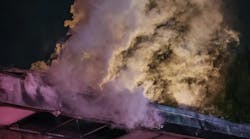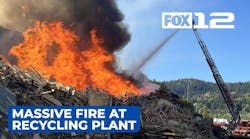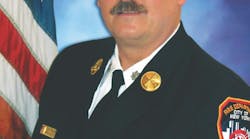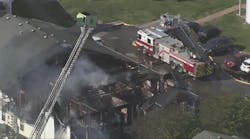Firefighters in Elgin know the risks associated with the kind of natural gas that warms homes or provides fuel for cooking. It’s a different story, though, when it’s compressed and used to power vehicles.
Waste Management, which already has eight garbage collection trucks running on compressed natural gas working in Elgin, gave firefighters and other officials an overview of how the fuel works in vehicles Tuesday during a presentation at the Elgin fire station on West Chicago Street.
“It’s important you guys are having these conversations,” Waste Management technical manager Mike Ehrenhaft told firefighters he saw discussing the topic. “That means that you are thinking about the what-ifs, and that’s really what this is all about.”
Waste Management, which purchased 29 compressed natural gas trucks for the western suburbs last year, started using them in Elgin in late 2018, Ehrenhaft said. They plan to buy another 25 this year, and already have 270 working in other parts of the Chicago area.
Because many do not understand how the trucks operate or what potential dangers exist, the company has started providing hands-on education and training for those municipalities that already have them on their streets, Ehrenhaft said.
“Typically, when we introduce new vehicles into a community, we like to bring in representatives of these communities and their emergency responders,” he said.
Natural gas vehicles are quieter than traditional diesel-fuel trucks, and the fuel is more readily available and abundant in the United States than diesel, Ehrenhaft said. Natural gas emits 20 percent less carbon and 30 percent less greenhouse gas emissions, and generally vehicles using it require less maintenance and fewer oil changes, he said.
Lou Ferruzza, a Waste Management district manager, said for every diesel truck replaced with a compressed natural gas model, the company reduces its diesel fuel usage by an average of 8,000 gallons per year — an annual reduction of 14 metric tons of emissions per year.
But they can pose risks. High gas pressure, gas asphyxiation and fire are among the potential dangers, just as they are for gasoline- or diesel-fueled vehicles, Ehrenhaft said. However, the idea that there is a greater chance for an explosion is not true, he said.
Waste Management’s vehicles are equipped with multiple safety features in the event of a fire or emergency, including internal gas leak detection systems and cylinder shut-off valves.
Among the information Elgin Fire Lt. Steve Hillgoth said he found it valuable were facts like compressed natural gas fuel lines shouldn’t be cooled with water during a fire because it will cause the temperature sensors that vent the gas to malfunction.
“It doesn’t matter if it’s a garbage truck or a train, it’s in our best interest as first responders to provide the best response to our communities (in the event of an emergency),” Hillgoth said.
Waste Management hopes to have as many as 9,000 compressed natural gas vehicles in operation in the United States and Canada by the end of 2019. All Waste Management vehicles operating in Elgin will use compressed natural gas by year’s end, Ehrenhaft said.
___ (c)2019 The Courier-News (Elgin, Ill.) Visit The Courier-News (Elgin, Ill.) at www.chicagotribune.com/suburbs/elgin-courier-news/ Distributed by Tribune Content Agency, LLC.






